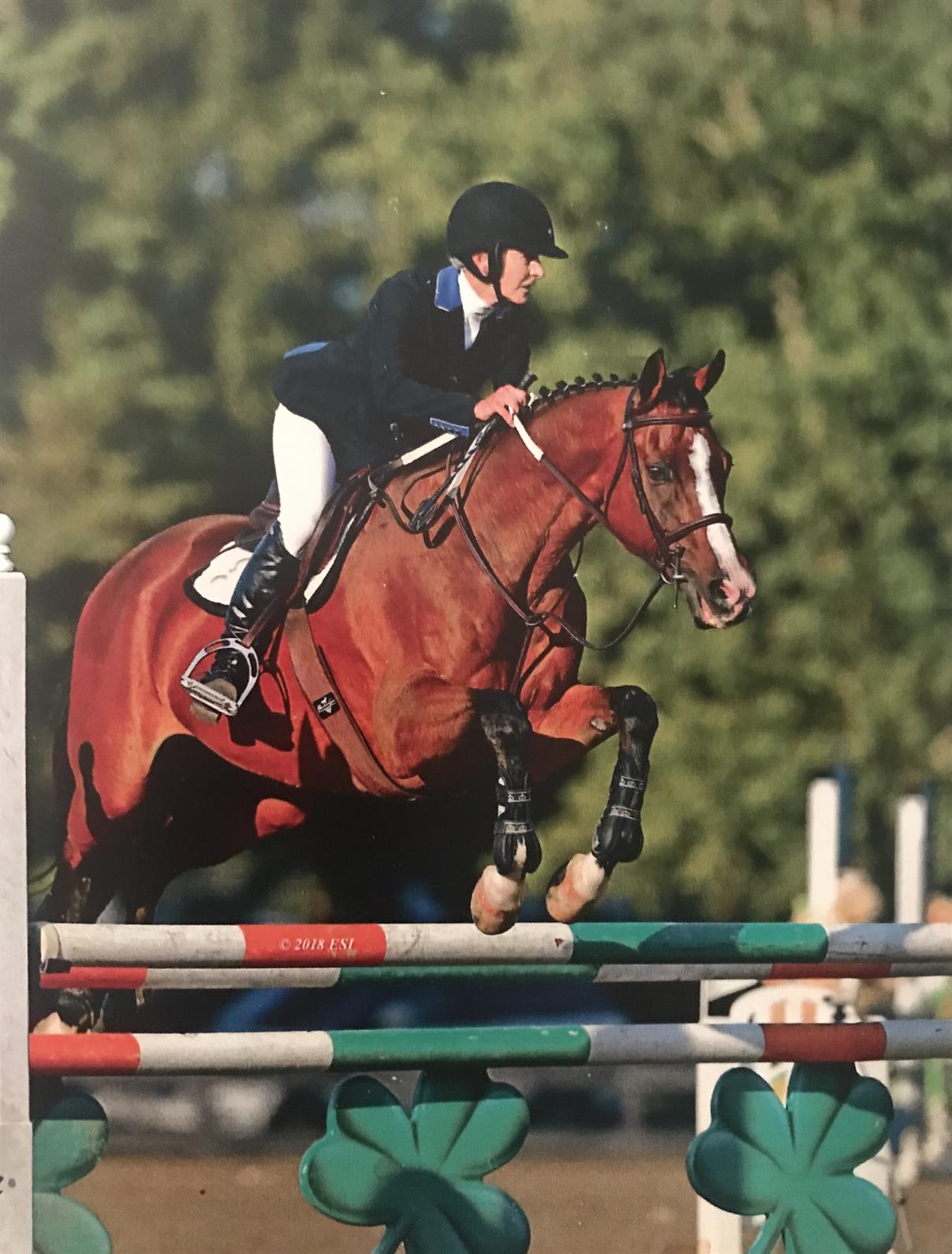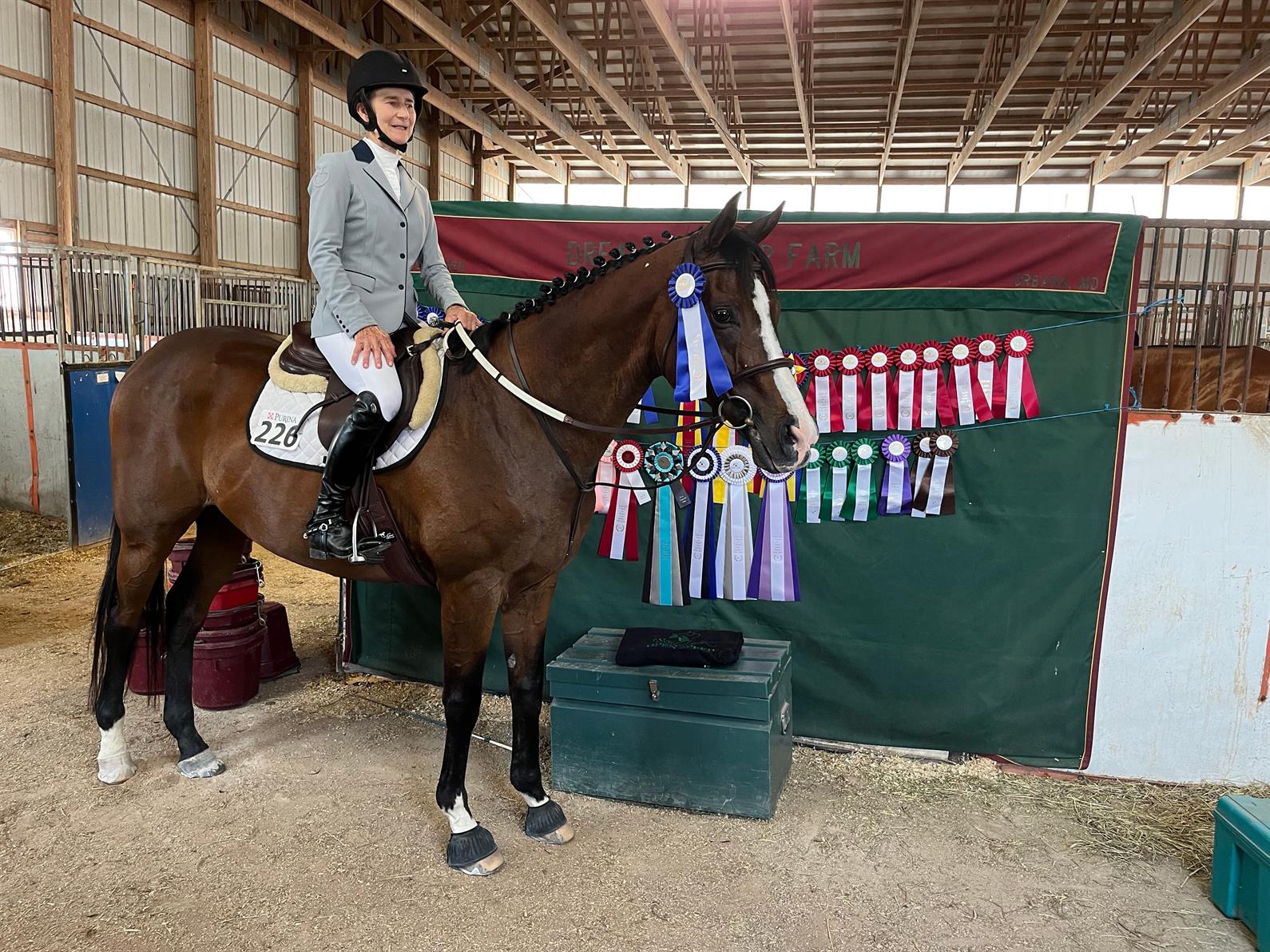
Dr. Alison Wichman, 71, competes in show jumping with her 22-year-old thoroughbred Venturesome. With a combined age of 93, they have a very specialized relationship.
“He's a really nice horse to be around. He's just good company, and I like spending time with him,” Wichman said. “He taught me a lot.”
The daughter of equine artist Adalin Wichman and architect William Wichman, Alison Wichman grew up in Lexington, Kentucky and was immersed in equestrian culture since she was born. As a young child, she began riding ponies and joined the U.S. Pony Club.
“My upbringing in Lexington was just unbelievable,” she said. “I love the Bluegrass. I still do. I couldn't have asked for a better group of people to grow up with.”
Wichman attended college and medical school in Virginia, and eventually, had a 39-year career at the National Institutes of Health in Bethesda, Maryland as a neurologist and research ethicist.
“Through much of my NIH career, I didn't do much riding, but around the late 90s, I started riding again,” Wichman said. “I was a hunter and equitation rider, but very soon figured out that jumpers were a better fit for me…and I have had a wonderful, fulfilling, 25-year renewed career riding with wonderful people and great horses.”
Wichman’s horse, Venturesome, is a registered thoroughbred and former racehorse who has competed as a jumper for about 14 years.
“Venturesome, at his age, is very happy in the Take 2 thoroughbred jumper division. I think it is important to support second careers for thoroughbreds,” Wichman said. “He seems to like two things: he likes to eat, and he likes to compete.”
Venturesome is not Wichman’s first experience with thoroughbreds; in fact, most of the horses she rode in her previous hunter and equitation careers were thoroughbreds.
“I really love thoroughbreds as a breed. There's a wide variation, but Venturesome is quite a classical thoroughbred. He's very smart. He has a really good work ethic. He has a distinct personality. He wants to do well,” Wichman said. “There are a lot of thoroughbreds that are super hot, and at this point in my career, I can't ride super hot, aggressive horses because I just don't have those instincts anymore. I don't like pulling on horses as much…so what he's taught me is how to stay out of the way. That's a really hard thing to do when you ride horses: to do just enough, but not too much.”
Wichman explained that Venturesome is a “sound horse,” able to maintain his health and competitive ability as he ages.
“We don't jump much at home; if we do jump, it's little things and trotting fences. I've been very lucky to work with some really good teachers,” Wichman said. “He doesn't need a lot of training. He just needs good conditioning and, I think, a lot of luck. I think some horses are just lucky. Knock on wood, Venturesome, except for one injury, has been very sound. And when he doesn't want to do it anymore, he doesn't have to do it anymore.”
Wichman also considers herself lucky to still be able to compete as she gets older, citing a good foundation of skills , a lifelong athleticism, and her support system as reasons why she has been able to compete for so long. Wichman and Venturesome train at multiple barns, but they primarily train at Dreamcatcher Farm in Adamstown, Maryland.
“When I started back again, I was extremely lucky to have really good people to help me. The barn that I'm in is a nice barn,” Wichman said. “You stay in the game by having really good horses, really good teachers, controlling the factors you can, and keeping your head in the right space.”

Overall, Wichman explained that equestrian sport maintained a desire in her to track and maintain her physical and mental health.
“To some degree, you can control your equestrian fitness, how much and how you practice; the other thing that you can do is put your head in the right space. When I was growing up, I didn't do a lot of thinking or research on the psychological aspects of competing, but I've gotten very interested in that,” Wichman said. “I've studied a lot and try to implement those principles in my daily practicing as well as in competition...The physicality, muscle memory, and psychological aspects of riding all have a neurologic basis, which is very interesting to me.”
Wichman recommended that all equestrians should formulate “rules of thumb” to guide their equestrian career. Her personal rules of thumb include her horse’s health taking first priority, maintaining her overall horsemanship skills and fitness, having fun, and being a role model to the equestrian community.
“You should be a mentor around your horses,” Wichman explained. “Conduct yourself in a responsible and professional way.”
What does the future hold for Wichman and Venturesome? Wichman explained that though Venturesome is in the “sunset of his career,” she will continue to compete with him as long as he wants to. Wichman continues to compete in jumping with both Venturesome and her new horse, a warmblood named Beijing Z.
“Pretty much all the horses I've had in my career are really professional horses. They really like to compete. I don't know how we find each other, because I like to compete, too, and I like horses that like to compete with me as partners,” Wichman said. “The partnership is really everything.”


